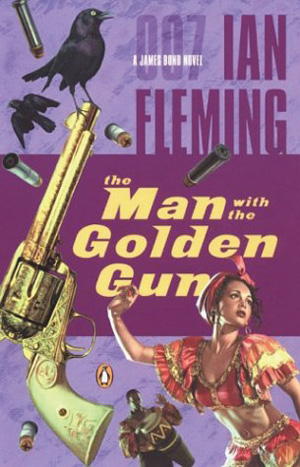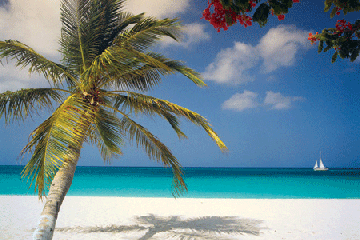|
In a Glass, Very Darkly - Ian Fleming's The Man With the Golden Gun

'A brainwashed James Bond has tried - and failed - to assassinate M,
his boss. Now Bond has to prove he is back on form and can be trusted
again. All 007 has to do is kill one of the most deadly freelance
hitmen in the world: Paco "Pistols" Scaramanga, the Man with the Golden
Gun. But despite his license to kill, 007 is no assassin, and on
finding Scaramanga in the sultry heat of Jamaica, he decides to
infiltrate the killer’s criminal cooperative - and realizes that
he will have to take him out as swiftly as possible. Otherwise 007
might just be the next on a long list of British Secret Service numbers
retired by the Man with the Golden Gun...'
The Man with the Golden Gun is the thirteenth James Bond novel written
by Ian Fleming and was first published, posthumously, in 1965. The book
begins with Bond - who was missing presumed dead because of the events
of You Only Live Twice where he ended the story suffering from amnesia
after an epic final encounter with Blofeld - turning up in London again
and being granted an audience with M. However, during the meeting, Bond
begins to rabidly extol the benefits and superiority of communism and
then attempts to murder M with a stream of liquid cyanide. He is foiled
and apprehended and it transpires that 007 had been brainwashed by the
Russians in Vladivostok - a place he had gone to seeking to unlock
something about his past.
Bond is duly deprogrammed and restored to something resembling his old
self by electroshock therapy. Retirement seems the most likely option
for our troubled hero but M decides instead to give Bond a new - and
quite possibly last - mission. Bond is asked to travel to the Caribbean
to terminate Francisco "Pistols" Scaramanga, a legendary killer known
as "The Man with the Golden Gun" for his chosen instrument of choice, a
gold-plated Colt 45. The feared Scaramanga is backed by Cuba and is
known to be responsible for the deaths of several British agents. If
Bond succeeds he can perhaps be of use to Queen and Country again, if
he fails he will become Scaramanga's latest and most famous victim. 'He
forced himself to think of what the broken body of Margesson must have
looked like, of the others that this man had killed, of the ones he
would kill afresh if Bond weakened. This man was probably the most
efficient one-man death dealer in the world.'
Generally regarded to be one of the weaker, if not the outright
weakest, of the James Bond novels, The Man With the Golden Gun has a
slightly experimental feel and a somewhat unfinished air, almost as if
it was accidentally printed just before the final conclusive draft was
completed. Apparently Kingsley Amis, who penned the excellent Bond
continuation novel Colonel Sun, gave the book a quick polish after
Fleming died - with this unsurprisingly leading to enduring speculation
about how much of The Man With the Golden Gun Fleming did or did not
actually write himself. One salient problem many had with the novel was
the way that, brainwashed Bond angle swiftly dispensed with, it quickly
returns to business as usual and gives Bond a small-scale adventure
that seems anti-climatic after the epic and surreal events of You Only
Live Twice. Though daft (Bond novels are nowhere near as serious as
some like to think), the brainwashed Bond intro is very gripping and
good stuff.

Bond's travels here take him to Kingston, Jamaica, where he poses as a
security expert and tracks down Scaramanga, who unwittingly hires him
to look after his yet to be completed Thunderbird Hotel. When
Scaramanga hosts a meeting of investors, Bond, with vague similarities
to the 1989 Timothy Dalton film Licence To Kill, secretly listens in
and quickly discovers there is much more to his target than he
suspected. The businessmen here are members of "The Group", an
organisation made up of Cuban secret police, American gangsters and
Soviet intelligence operatives. This shady collection of characters is
in the business of drug-smuggling and industrial-sabotage and seeks to
undermine the West and help Cuban-owned sugar plantations to corner the
world market. Although Scaramanga is best known for Christopher Lee's
highly enjoyable and polished interpretation in the (obviously very
different) 1974 film adaption, the Scaramanga of the novel comes across
as a fairly normal thuggish villain who has no major ingenious scheme -
the plot revolving around drug smuggling and the supply of sugar. It
isn't exactly Auric Goldfinger attempting to rob Fort Knox in terms of
excitement. It's quite good fun though nonetheless to have Bond
undercover - as Mark Hazard of Transworld Consortium.
Although the novel is noticeably less detailed than Fleming's usual
fare it still (enjoyably) contains his obsession with food and the
general high life of an expense account spy. Dining with secretary and
assistant Mary Goodnight at Morgan's Harbour, Bond requests lobsters
and 'a pot of that ridiculously expensive foie gras of yours' with
champagne on ice. At Blades, 'a grilled Dover sole followed by the
ripest spoonful he could gouge from the club Stilton' is Bond's
standard lunch and the book is also packed with elaborate references to
drink with Bond seemingly quaffing every beverage known to man in the
course of the story. 'And there would be drink!" muses a parched Bond,
trapped under a scorching Jamaican sun. "Champagne in frosted silver
coolers, rum punches. Tom Collinses, whisky sours.' As ever with the
Fleming Bond novels there are one or two dated and slightly
head-scratching moments for contemporary readers, such as when we read
- 'Now it may only be a myth, and it is certainly not medical science,
but there is a popular theory that a man who cannot whistle has
homosexual tendencies...'
Fleming's penchant for liberally inserting factual information into the
story does rear its head on the topic of Rastafarianism but, happily,
Moneypenny, Bill Tanner and, especially, Felix Leiter, all play a part
in the story.
One interesting aspect or undercurrent to The Man With the Golden Gun,
and it's a theme that seemed to be gradually creeping into Fleming's
work near the end, is that Bond is starting to feel slightly old for
the first time in his life and moments of bittersweet nostalgia begin
to enter his thoughts as he reflects on the past. In the sultry heat of
Jamaica on the trail of Scaramanga, he thinks of Honeychile Wilder, his
old flame from Dr No, and a rather poignant passage occurs. ‘What
were a couple of hours of heat and boredom in this island compared with
memories of Beau Desert and Honeychile Wilder and his survival against
the mad Dr No? James Bond smiled to himself as the dusty pictures
clicked across his brain. How long ago it all was! What had happened to
her? She never wrote. The last he had heard, she had had two children
by the Philadelphia doctor she had married.’
The Man with the Golden Gun is very readable with some nice touches but
on the whole feels like a slight, familiar and somewhat unfinished
addition to the series. If Fleming had lived to complete the novel to
his satisfaction it could have been much more. As it stands, The Man
with the Golden Gun is a decent thriller but only an adequate James
Bond book.
- Jake
c 2010
Alternative 007
|

|


